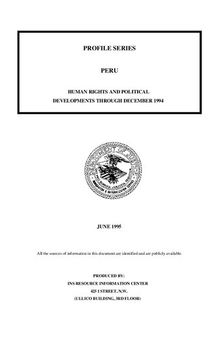دانلود کتاب Peru: Human Rights and Political Developments through December 1994
by INS RESOURCE INFORMATION CENTER|
|
عنوان فارسی: پرو: حقوق بشر و تحولات سیاسی تا دسامبر 1994 |
 دانلود کتاب
دانلود کتاب
 جزییات کتاب
جزییات کتاب
that may befall a nation, Peru has suffered a disproportionate share over the past fifteen years, falling
victim to a cycle of political upheaval and economic disruption. More than half of the population
suffers extreme poverty. Fourteen years of political violence have taken over 20,000 lives, caused
billions of dollars in material damage, and displaced more than half a million people. A cholera
epidemic has killed thousands of Peruvians since 1991. Peru has been labeled one of the poorest and
most violent nations in South America.1/
Since 1980, successive Peruvian governments have fought a brutal war against Sendero
Luminoso (Shining Path), a violent, self-proclaimed Marxist movement which seeks to overthrow the
government. In the course of the conflict, both the guerrillas and government security forces have
committed grave violations of human rights. Sendero has employed both targeted and indiscriminate
violence to terrorize the government and the population. Despite the September 1992 capture of
Sendero's leader, Abimael Guzmán, the guerrillas continue to carry out attacks, though at a
significantly reduced level.2/
The Peruvian government's response to the threat posed by Sendero has been similarly brutal.
Disappearances, extrajudicial executions, and torture have proliferated as the government security
forces have used broad powers to combat the insurgent movement. In April 1992, President Alberto
Fujimori suspended the Peruvian Constitution in a "self-coup" (autogolpe) that strengthened the
executive and military at the expense of democratic institutions and human rights. Abuses perpetrated
by the security forces, particularly arbitrary arrest and prolonged detention generally accompanied by
torture or other brutal treatment, have continued since Fujimori's coup.









 این کتاب رو مطالعه کردید؟ نظر شما چیست؟
این کتاب رو مطالعه کردید؟ نظر شما چیست؟
